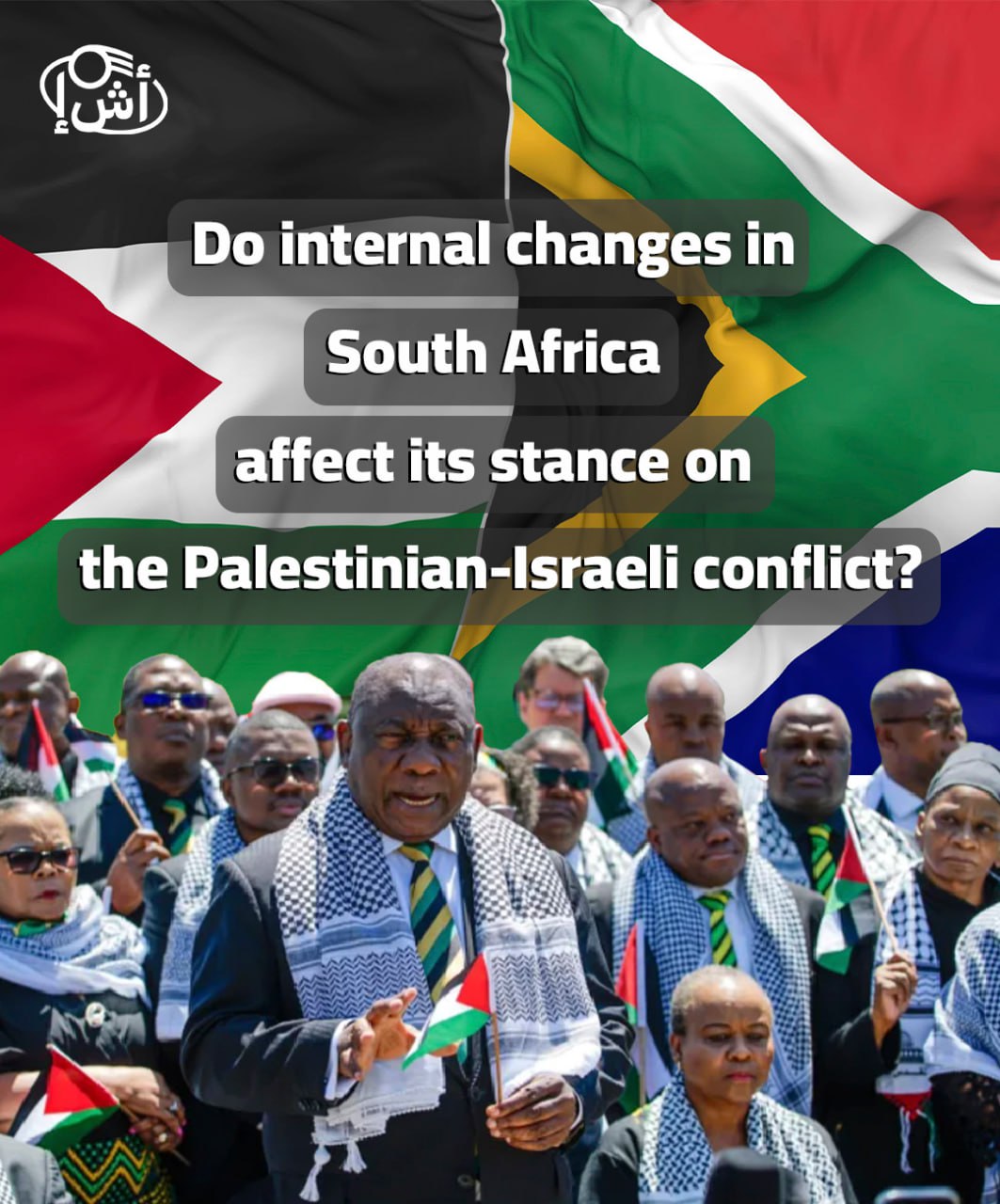In light of the recent political changes in South Africa, questions have arisen about the extent of the country’s continued support for the Palestinian cause, especially after the formation of a new coalition government that includes parties with different positions on the conflict in the Middle East.
What happened in the elections was that the African National Congress lost the parliamentary majority by obtaining 159 seats, while the Democratic Alliance came in second with 87 representatives in Parliament, the uMkhonto Party 58 seats, and 15 parties and political movements occupied the rest of the seats in Parliament, and the following figure shows the distribution of seats for all parties:

This political situation prompted President Cyril Ramaphosa to form his government after weeks of negotiations and negotiated ministerial positions with 11 partners, while Paul Mashatile retained the position of Vice President, and Ronald Lamola was appointed Minister of International Relations and Cooperation, and this balance in the government makes it possible to take strong political positions. Especially regarding the Palestinian issue, it is a complex matter as a result of the multiplicity of parties and varying positions, but most parties take a more biased position on the Palestinian issue, and the graph provides a picture of the percentage of support provided politically to the Palestinians:

It can be noted that the group that strongly supports the Palestinians is the largest, such as the African National Congress and the Economic Freedom Fighters, which reflects sympathy and strong support for the Palestinian cause. These parties see that this support falls within the framework of combating racism and discrimination. As for neutral parties, such as the Democratic Alliance, they seek to maintain relations. Diplomacy with both Israel and Palestine. There is a group that supports severing diplomatic relations, closing the Israeli embassy, and suspending relations with Israel. It does not represent an effective force, but it is considered supportive of alliances that support taking firm positions on the Palestinian issue. In general, the graph reflects a clear difference in the positions of the southern parties. African support for the Palestinian issue, with a strong trend towards supporting the Palestinians, especially from parties with leftist or nationalist tendencies.

The path of the international court:
South Africa made a strong effort during the current war on Gaza and filed a lawsuit against Israel in the International Court of Justice. In which Israel was accused of committing “genocide” in Gaza, and this unprecedented step towards Israel can be considered a break from all the restrictions that the United States, in the first place, tried to impose on any movement that affects Israel, and the court will not stop even with the presence of a new government in South Africa, because the political trend The general public, both in South Africa, and in the world in general, is taking a turn to hold Israeli Prime Minister Benjamin Netanyahu accountable at least, and this step by South Africa is related more to its political strategy than to being a specific position of the National Congress Party.

According to current indicators, the new South African government and the new balances in Parliament will not affect the political scene, although the new coalition, which includes the Democratic Alliance Party and the nationalist Inkatha Freedom Party, holds different views on international issues, including the Palestinian-Israeli conflict, because the commitment to a foreign policy Grounded in human rights and global solidarity, as stated in the coalition agreement, it remains a key focus in determining how South Africa deals with international conflicts. This includes maintaining support for Palestine and continuing to promote the African Agenda 2063, which seeks to achieve a more just and peaceful world.

On the other hand, the new political formation in the South African Parliament is a test of the complexities of the new government coalition, and South Africa’s ability to continue its role as a defender of human rights, especially in light of the increasing criticism from some right-wing parties such as the National Populist Alliance, which sees South African foreign policy as a challenge. For the new international reality, reconciling the principles of government and the need for national unity will constitute the main focus of the next stage, especially since the African arena has various crises, bloody conflicts, and severe international polarization. The Palestinian issue is the “standard” for transformation or survival, given that the differences in international positions towards it closely match the positions of African crises.
The West and South Africa’s movements
The American and European position in general regarding South Africa’s actions regarding the war on Gaza presents a complex picture. As for South Africa, which suffered for decades from severe situations during the apartheid rule of the United States, it is forced to find a balance between strategic interests and moral obligations. Many Western countries consider the lawsuit filed by South Africa against Israel in the International Court of Justice; It represents a challenge to the traditional Western narrative that stresses the need to defend democracies in the face of terrorism, and considers that South Africa’s position could set a dangerous precedent, encouraging other countries to challenge Western influence in international issues, which raises fears of the erosion of Western dominance over international institutions.

Certainly, there are some voices in the West who see in South Africa’s movements a strengthening of global efforts towards justice, equality and human rights, and call for a re-evaluation of Western policies towards the Middle East and the strengthening of the principles of international law and pluralism, but these voices remain far from the political circles of major capitals, so South Africa’s position remains Africa faces a challenge by finding a path in which it preserves its diplomatic and economic interests with the West, while finding a balance regarding its positions on the Palestinian issue or other issues related to the African continent.
Written by Nidal Al-Khedary
23 countries warn of escalating risk of nuclear conflict

